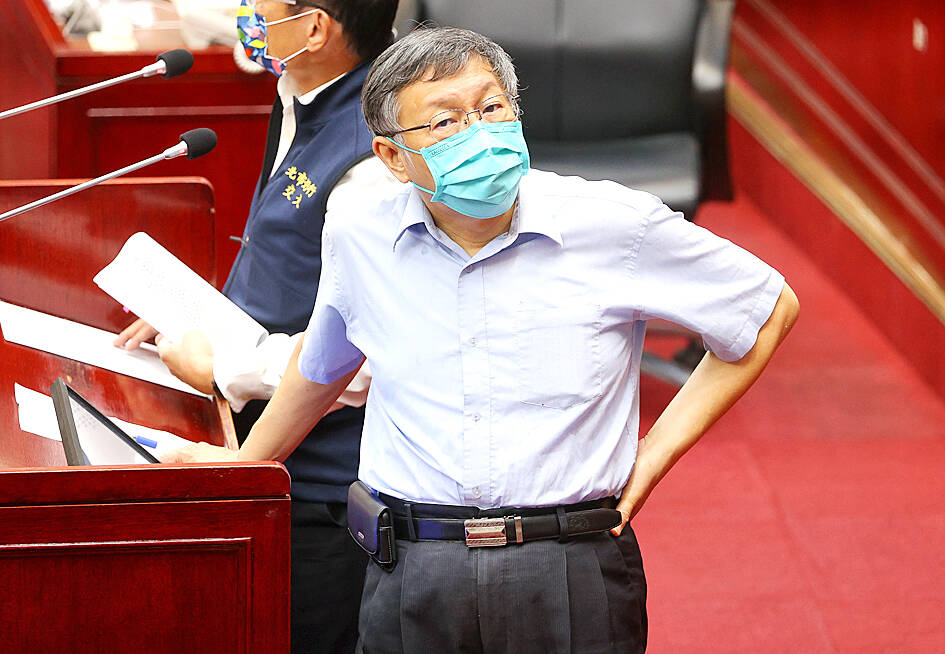Taipei Mayor Ko Wen-je (柯文哲) is pandering to Beijing and would like to see Taiwan capitulate in a potential war with China, Democratic Progressive Party (DPP) Deputy Secretary-General Lin Fei-fan (林飛帆) said yesterday.
Lin made the remarks in a Yahoo TV show hosted by political commentator Wang Shi-chi (王時齊).
Lin said Ko’s views on defense show he is a “defeatist” and his advocacy for appeasement shows that he thinks Taiwan should surrender if war breaks out with China.

Photo: CNA
Wang said Ko’s views were exemplified by him last week telling the Taipei City Council that the “goal is to safeguard Taiwan, but in doing so, there is no need to go against China. We do not have to link the two together.”
“When we go against China, how can we safeguard Taiwan? That is the question mark for me,” Ko told councilors in a question-and-answer session.
“Taiwanese should do things that enable people in China to like us. That is the highest goal. If they do not like us, then we will have trouble... The two sides [of the Taiwan Strait] should hold talks, it is better for happiness as members of one big family,” Ko said.
Lin said Ko is trying to promote the idea that defending Taiwan against China is useless and Taiwanese should instead accept that they are members of the Chinese family.
Ko is also a proponent of the so-called “1992 consensus,” Lin said.
The so-called “1992 consensus,” a term former Mainland Affairs Council chairman Su Chi (蘇起) in 2006 admitted making up in 2000, refers to a tacit understanding between the Chinese Nationalist Party (KMT) and the Chinese government that both sides of the Strait acknowledge there is “one China,” with each side having its own interpretation of what “China” means.
In Ko’s version, that means calling for capitulation to China, Lin said.
“Taiwan belongs to the world, and we are among the world’s democratic nations, willing to advance collaboration with the international community,” Lin said.
DPP Lienchiang County commissioner candidate Lii Wen (李問) said that despite Lienchiang residents having a front-row view on Chinese live-fire drills last month, they were unimpressed.
“People have no fear, and the drills had little effect on their daily lives. Tourism and other sectors of the local economy are operating as normal,” he said.
They are more concerned about China’s “gray-zone” warfare, including Chinese boats dredging sand and illegally fishing near Matsu, he said.
There had been confrontations between Chinese boats and local fishers, he added.
This story has been amended since it was first published.

Taiwan has received more than US$70 million in royalties as of the end of last year from developing the F-16V jet as countries worldwide purchase or upgrade to this popular model, government and military officials said on Saturday. Taiwan funded the development of the F-16V jet and ended up the sole investor as other countries withdrew from the program. Now the F-16V is increasingly popular and countries must pay Taiwan a percentage in royalties when they purchase new F-16V aircraft or upgrade older F-16 models. The next five years are expected to be the peak for these royalties, with Taiwan potentially earning

STAY IN YOUR LANE: As the US and Israel attack Iran, the ministry has warned China not to overstep by including Taiwanese citizens in its evacuation orders The Ministry of Foreign Affairs (MOFA) yesterday rebuked a statement by China’s embassy in Israel that it would evacuate Taiwanese holders of Chinese travel documents from Israel amid the latter’s escalating conflict with Iran. Tensions have risen across the Middle East in the wake of US and Israeli airstrikes on Iran beginning Saturday. China subsequently issued an evacuation notice for its citizens. In a news release, the Chinese embassy in Israel said holders of “Taiwan compatriot permits (台胞證)” issued to Taiwanese nationals by Chinese authorities for travel to China — could register for evacuation to Egypt. In Taipei, the ministry yesterday said Taiwan

Taiwan is awaiting official notification from the US regarding the status of the Agreement on Reciprocal Trade (ART) after the US Supreme Court ruled US President Donald Trump's global tariffs unconstitutional. Speaking to reporters before a legislative hearing today, Premier Cho Jung-tai (卓榮泰) said that Taiwan's negotiation team remains focused on ensuring that the bilateral trade deal remains intact despite the legal challenge to Trump's tariff policy. "The US has pledged to notify its trade partners once the subsequent administrative and legal processes are finalized, and that certainly includes Taiwan," Cho said when asked about opposition parties’ doubts that the ART was

If China chose to invade Taiwan tomorrow, it would only have to sever three undersea fiber-optic cable clusters to cause a data blackout, Jason Hsu (許毓仁), a senior fellow at the Hudson Institute and former Chinese Nationalist Party (KMT) legislator, told a US security panel yesterday. In a Taiwan contingency, cable disruption would be one of the earliest preinvasion actions and the signal that escalation had begun, he said, adding that Taiwan’s current cable repair capabilities are insufficient. The US-China Economic and Security Review Commission (USCC) yesterday held a hearing on US-China Competition Under the Sea, with Hsu speaking on